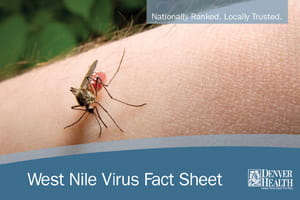West Nile Virus is a potentially serious disease carried by mosquitoes. People get West Nile Virus after being bitten by an infected mosquito or handling a bird that died from West Nile Virus. Download West Nile Virus fact sheet.
Who gets West Nile Virus?
Anyone can get West Nile Virus. People who work outside or participate in outdoor activities are the most likely to get infected, while people over the age of 60 have the greatest risk of severe illness.
What are the symptoms of West Nile Virus?
Most people don’t show any symptoms of West Nile Virus. Around 20 percent of people will develop flu-like symptoms, including:
- Fever
- Heath and body aches
- Joint pains
- Vomiting
- Diarrhea
- Rash
About one percent of people with West Nile Virus develop severe neurologic effects, which are sometimes permanent or fatal. Symptoms of severe West Nile Virus include:
- High fever
- Neck stiffness
- Disorientation
- Coma
- Tremors
- Seizures
- Paralysis
How is West Nile Virus treated?
There is no specific treatment for West Nile Virus. Most people recover completely, although fatigue and weakness can last for weeks or months.
What can I protect myself form West Nile Virus?
There is no West Nile Virus vaccine, but you can prevent it by avoiding mosquito bites.
- Use insect repellent containing DEET (less than 35% for adults and less than 15% DEET for children).
- Wear long-sleeve shirts and pants when mosquitoes may be present.
Be extra careful outside during peak mosquito hours from dusk to dawn. Wear long sleeves, insect repellent and avoid going outside during these hours if possible.
How can I keep mosquitoes away from from my home?
Mosquitoes breed in standing water. Empty any containers, tires, birdbaths, gutters and buckets that have collected water. Screen doors and windows can also keep mosquitoes from entering your home.
Avoid over-watering of turf and landscapes. This can result in creating long-term puddles in street gutters. Please contact the Denver Department of Public Health and Environment (by calling 3-1-1) if you see multiple sick or dead birds in your neighborhood.
Who should I contact if I believe a family member has West Nile Virus?
Contact your doctor or call Denver Public Health at 303-602-3614.
Sources:



